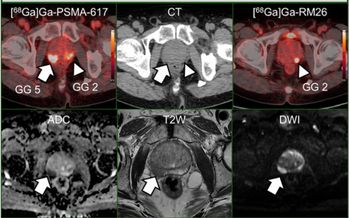
MR mammography excels as presurgical planning tool in dense breasts
An Italian study involving 238 women has confirmed the value of MR mammography as a presurgical planning tool for appreciating the full extent of cancer in dense breasts.
An Italian study involving 238 women has confirmed the value of MR mammography as a presurgical planning tool for appreciating the full extent of cancer in dense breasts.
Dr. Federica Pediconi, a researcher in the department of radiological sciences at the University of Rome La Sapienza, and colleagues found MR mammography superior to diagnostic mammography and ultrasound for detecting malignant lesions in women with suspected disease from screening mammography or ultrasound. They reported their results in a poster presented at the 2008 ISMRM meeting.
MR mammography, diagnostic mammography, and ultrasound were performed before planned breast surgery. The sensitivity of each imaging modality was established during pathology or 12 to 18-month clinical follow-up.
Imaging was performed on a 1.5T MR scanner using a bilateral surface breast coil. The protocol involved a precontrast T2-weighted STIR sequence and dynamic 3D T1-weighted FLASH sequence acquired before and at two-minute intervals after the administration of 0.1 mmol/kg gadobenate dimeglumine contrast medium.
Malignant or benign lesions were identified in 74 of 138 patients on x-ray mammography, 135 of 195 patients on ultrasound, and 162 of 238 patients on MR mammography.
Malignant disease was detected in 75.7%, 82.5%, and 94.9% of patients with dense breasts on x-ray mammography, ultrasound, and MR mammography, respectively. X-ray mammography detected multifocal, multicentric, and contralateral disease in one, three, and three patients, respectively, compared with seven, eight, and six patients on ultrasound, and 12, nine, and 24 patients on MR mammography.
The ability of MR mammography to enable the oncologist and surgeon to appreciate the full extent of, especially, multicentric and contralateral disease has important implications for surgical planning and the long-term survival of cancer patients with dense breasts, according to Pediconi.
She was first author of an earlier study of 118 women that demonstrated that contrast-enhanced MR mammography positively affects patient management decisions for women with diagnosed breast cancer and should be performed on all women with breast cancer diagnosis based on clinical examination, mammography, or ultrasound (Radiology 2007;243:670-680).
Newsletter
Stay at the forefront of radiology with the Diagnostic Imaging newsletter, delivering the latest news, clinical insights, and imaging advancements for today’s radiologists.














